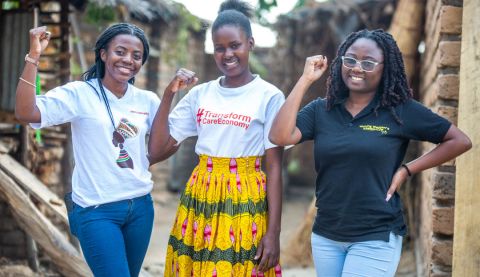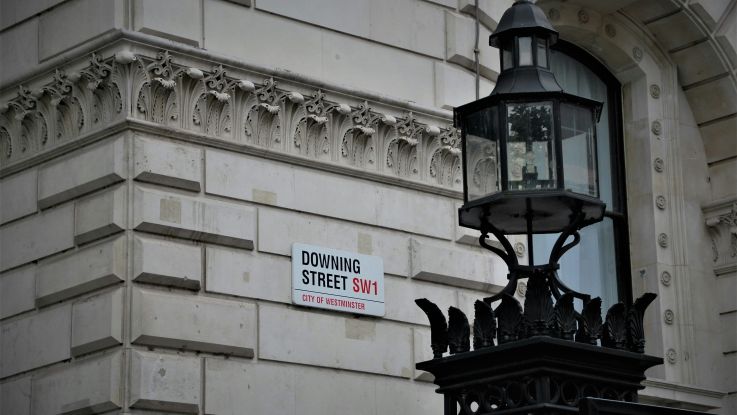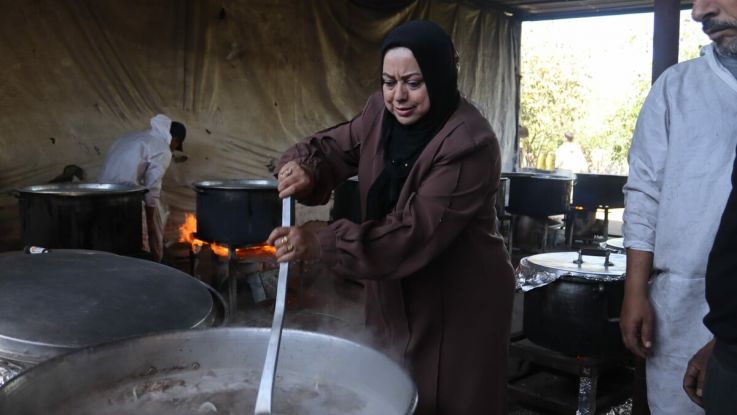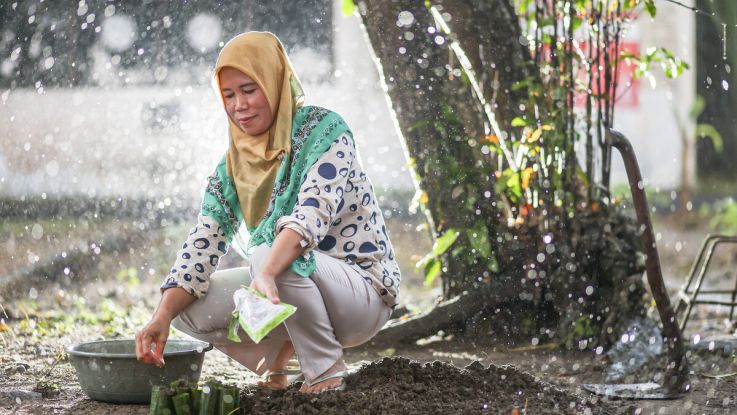Human Rights Day and the economy: Another world is possible
7 December 2023
This Human Rights Day (Sunday 10th December) marks 75 years since the UN Declaration of Human Rights was adopted. When it was created in 1948, the Declaration enshrined the fundamental rights and freedoms of all human beings. With the world facing a climate emergency, the cost-of-living crisis and multiple conflicts, it is clear that the Declaration is more relevant than ever, yet the promise of dignity and equality in rights for everyone remains unfulfilled.

Eneless Hudson (centre), 25, is challenging austerity measures through the Mchinji Young Women Hub in Malawi. Photo: Fletcher Simwaka/ActionAid
The economy and women’s human rights
Feminist economists have long highlighted the relationship between our economic system and women’s human rights.
The current neoliberal economic system is one that drives inequality, undervalues women’s paid and unpaid care work and continues to undermine women’s human rights while enabling private companies, international financial institutions and others to harm women and girls through a focus on privatisation and deregulation.
At the same time, it is a system that often ignores and devalues the services and policies that could support women and girls’ rights and reproduces inequalities and injustices rooted in colonialism and racism, within a global financial architecture that remains undemocratic, unrepresentative and unaccountable.
The pandemic and subsequent policy decisions brought this into sharp focus. The precarity of many women’s jobs was exposed as livelihoods were lost almost overnight when factories closed or lockdowns were imposed. Covid-19 also shone a light on the burden of women’s unpaid care work, with women and girls taking on additional childcare when schools closed.
Putting profits before people
Long before the pandemic, economic policies encouraged by international financial institutions like the IMF have undermined the rights of women and girls.
Few governments recognised the value of women’s paid or unpaid care work and the foundational role it plays in our societies and economies. Since the 1980s, economic reforms linked to policy advice from the World Bank and IMF have led to sustained cuts in public services, with women filling the gaps through their unpaid care work, which remains invisible and unrecognised.
Instead, governments have focused on privatisation and deregulation as the best way to grow the economy. This has allowed the wealth of multinational companies and of individuals to soar and enabled companies to commit human rights and environmental harms.
Malawi – why the current economic model isn’t working
These impacts reverberate along intersecting lines of race, class, caste, geographical location, migrant status, with black and brown women from the ‘global South’ impacted most.
In Malawi, for example, ActionAid has examined whether the current economic model is working for women and girls there. The short answer is, it isn’t.
In Malawi, the pursuit of a neoliberal approach to economic development has not resulted in the eradication of poverty or inequality.
Rather, due to 75 years of British colonisation, external debt demands and damaging IMF and World Bank policy advice and loans, 70% of Malawi – or 13 million people – live on less than $2.15 a day. This is despite Malawi being rich in natural resources and having a vibrant youth population.
Damage to public services as a result of austerity measures has been compounded by the country’s debt crisis, in itself a crisis created and perpetuated by global north countries.
At the same time, Malawi loses over $60 million every year to multinationals and wealthy elites diverting their wealth to tax havens, equivalent to more than 30% of the country’s health budget.
Meanwhile, in global supply chains, where thousands of women in Malawi are employed, there have been allegations of low pay, poor working conditions and systemic gender-based violence, including sexual assault.
Another world is possible
ActionAid has long called for a shift towards feminist economic alternatives that prioritise care, wellbeing, human rights and climate justice.
In Malawi, ActionAid has been working with young women who are calling on their government to urgently adopt a feminist wellbeing approach to the economy.
For them, this includes putting women’s rights and gender equality at the heart of budgeting decisions and financing public services. It also means promoting progressive forms of tax and clamping down on tax avoidance and evasion.
Crucially, young women in Malawi are calling for greater transparency in decision making and accountability from their government.
What can the UK Government do?
There is much that needs to be done by governments in the ‘global north’ to make a feminist economy a reality, and with it the full realisation of women’s human rights.
Key is recognising the importance of women’s unpaid and paid care work and ensuring that macroeconomic policies prioritise the wellbeing of people and planet.
This includes measuring the effectiveness of policies by how far the economy is supporting wellbeing and the realisation of human rights.
With others, ActionAid is also calling on the UK Government to introduce a legal requirement on all companies to undertake gendered human rights and environmental due diligence on their supply chains, to ensure their activities do not violate human rights or on the planet.
The Government can also use its place in global spaces – including at the IMF - to call for an end to policy advice that promotes austerity. Instead, the UK should promote space for governments to build up and sustain robust public services.
ActionAid has also called for the UK to develop a pro-women, pro-human-rights trade policy which has respect for human rights as a primary objective, and which references international obligations on human rights, gender and climate justice.
Given the importance of progressive taxation for the funding of public services, the UK should support global measures to create a fairer tax system – including a UN Tax Convention. At the same time, the UK must urgently and proactively engage in measures to restructure and cancel the debt of countries facing debt distress and crisis.
Momentum around the wellbeing economic agenda continues to gain pace – the UK should be at the forefront of that movement.
Read more about our work on Feminist Wellbeing Economy in Malawi.



